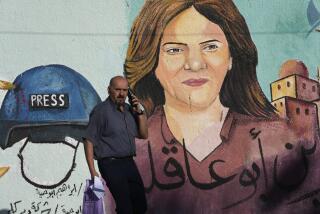Little Support for Hussein in U.S.-Arab Press : Media: Most Arab-American journalists condemn Iraq’s invasion of Kuwait. But they fear the United States has only increased tensions by sending in troops.
- Share via
Saddam Hussein gained popularity in some Arab nations after U.S. troops arrived in the Middle East, but the Iraqi president is finding few oases of support among local Arab- and Iranian-American journalists.
“Saddam Hussein invaded Kuwait and it’s wrong,” said Joseph Haiek, publisher of the Glendale-based Arab-American monthly magazine The News Circle. “If you have a legitimate grievance, you work it out. You do not occupy and put down the dignity of an entire nation.”
Ira Bahrami, editor of the Encino-based weekly magazine Iran News, took an even stronger position.
“We condemn this invasion of Kuwait,” said Bahrami, mindful of the recent eight-year Iraq-Iran war. “We know Saddam Hussein is a madman, is going to build up a big war and is unpredictable.”
As their readership clamors for information, local Arab- and Iranian-American publications have added pages, increased circulation and devoted large sections to the Middle East crisis. Several publications talk to official and unofficial sources in the region and provide news for readers from many nations. (Although geographically close, Iranians historically have not considered themselves part of the Arab world. They are Persian.)
Their editors and reporters also have been tapped by the mass media as sources. Samir Twair, Los Angeles correspondent for the Arab American News of Dearborn, Mich., said that during the last two weeks, he has granted more interviews than ever. Twair said he has been called by two area radio and four local television stations, as well as The Times, Cable News Network and the Long Beach Press Telegram.
While writing for the national weekly newspaper, which has a circulation of 15,000, Twair found support for both sides involved in the conflict. Of the roughly 25 local Arab-American community leaders he interviewed, half sided with Iraq and half with Kuwait.
“The pro-Iraqi people thought Iraq had a historical claim to Kuwait,” he said, “and that Iraq wanted to get hold of the oil resources to distribute the wealth to poor Arab nations, including Lebanon, Egypt, Yemen and Sudan.
“But everyone I interviewed agreed that U.S. forces should not be deployed in the Persian Gulf. They thought that the U.S. reacted too swiftly without diplomacy. They thought troops might increase tension instead of reducing it.”
A more typical response to Hussein among local Arab journalists came from the 15,000-circulation Beirut Times of Los Angeles. During the crisis, the English and Arabic weekly newspaper is printing 2,000 extra copies and devoting up to 20 of its 48 pages to the Middle East.
“We have criticized the invasion, we are supporting the U.N. sanctions, and we are with President Bush to send troops over there to save other lives,” said owner and editor Michel Bou Abssi.
“But we have criticized the invasion in a general way that applies to all invasions. We want the Syrian army out of Lebanon and the Israelis out of southern Lebanon,” he added.
At the weekly Iranian news magazine Rah-Zendegi (Way of Life), reporter Ali Arbabi wrote an article condemning Iraq for taking hostages.
“The hostages (should be) released as soon as possible,” he said. “All the Arab and Muslim countries are blamed for them. This is not good for people who want to live peaceably either abroad or in their own countries.”
Arbabi said the media portrays Iranians as “terrorists or hostage-takers. The Iranian people are not like that. They never took hostages before Ayatollah (Ruhollah) Khomeini.”
Arbabi said his 78-page Arabic and English magazine has increased circulation 10% since the crisis to a total of 10,000.
Syrus Sharafshahi, director of the 10,000-circulation Sobh-E-Iran (Morning of Iran) daily newspaper, also condemned the hostage-taking.
“It is against international law,” he said. “We say that every time. Four years ago, we said that about the hostages in Lebanon.”
Sharafshahi warned that a prolonged crisis would hurt the United States. “To be in the crisis a long time is dangerous to America because all the moderate countries in that region will get angry at America,” he said.
Varied readership sometimes keeps editors from taking positions on Mideast disputes.
“If we take one side, this is not going to go better for the paper,” said Beirut Times reporter Zeina I. Bawab. Bawab said her newspaper’s advertisers come from countries including Lebanon, Iraq, Jordan, Kuwait and Saudi Arabia.
Adel Barakat, president of the Arab American Press Guild for local journalists, said editors are worried about the crisis.
“They say that if the war happens, everyone will pay,” he said. “The price of oil will go up and we will have a recession. One man has children in the Saudi Arabian army. He is very scared.
“Plus, I don’t see anybody who likes war. Because if we can sit together and talk, why are we fighting? At the end (of the fighting) we have to listen to each other.”
Barakat, who worked nine years as a Kuwaiti journalist and now contributes to local publications, sent President Bush a telegram.
“I said you are the greatest and the strongest nation in the world,” he recalled. “You can win the war but dearly at a price that God objects to.
“Take the peace initiative from Mr. Saddam Hussein. He will withdraw from Kuwait when Israel pulls out from the West Bank. Ask the Emir of Kuwait to choose between accepting U.S. citizenship or ruling Kuwait again over the American dead bodies.
“I told him, ‘Peace is the best,’ ” Barakat said. “ ‘Be smart. God bless you.’ ”
More to Read
Sign up for Essential California
The most important California stories and recommendations in your inbox every morning.
You may occasionally receive promotional content from the Los Angeles Times.










